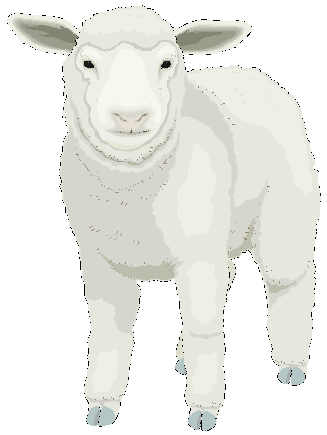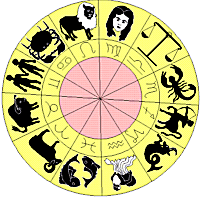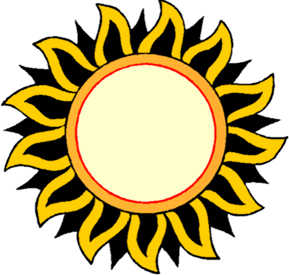Dawn at the Wall
Nissan 5756 / 21st March 1996 - 19th April 1996

THIS MONTH'S SIGN
T'LEH / ARIES
Nissan is the first month of the Jewish Year. Its sign is T'leh - the lamb (Aries). When the Jewish People were about to leave Egypt, G-d commanded them to take a lamb, which the Egyptians worshiped as a god, and lead it through the streets to their home. They tied the lamb to their bed-posts, and three days later, it was this lamb which served as the Pesach sacrifice. Its blood was used to mark the doors and lintels so that G-d would 'passover' the Jewish homes, and it was eaten at the first seder on the very night that the Jewish People left Egypt. On Shabbat, the tenth of Nissan, the Egyptians saw the Jews leading lambs through the street and asked "What is this lamb for?" The Jews replied "We're going to slaughter it as a Pesach sacrifice, as G-d has commanded us." You can imagine how the Egyptians felt - seeing their god led through the street in order to be slaughtered and eaten. Miraculously, however, they were prevented from harming the Jewish People. They ground their teeth in fury, but did not utter a murmur. We commemorate this miracle on the Shabbat immediately preceding Pesach on Shabbat Hagadol - 'the Great Shabbat'.
THE TWELVE AGES OF MAN
 The cycle of the mazolot (astrological signs), is like the cycle of the life of a man: In the beginning, when he is born,
Man is like a lamb (T'leh/Aries) - soft and delicate.
As he grows, he becomes powerful like an ox (Shor/Taurus).
Then he becomes like the twins (Teumim/Gemini):
He sees himself as complete and perfect. Then his yetzer hara
(negative impulse) starts to grow. At first it is as small
as a crab (Sartan/Cancer), but if left unchecked,
it becomes as strong as a lion (Arieh/Leo). If he
sins, his yetzer hara puts on the mask of innocence, appearing
as pure as a maiden (Betula/Virgo). And if he continues
to transgress, he is placed in the Scales (Moznaim/Libra),
and his fate is weighed in the balance. If he persists in his
rebellion, he is sent down to the depths, placed in a pit like
a scorpion (Akrav/Scorpio). However, if he has a
change of heart and returns to G-d, he is rocketed out of the
pit like an arrow from the bow (Keshet/Sagitarius).
Then he is transformed, returned to his former state of innocence
and becomes like a kid (G'dee/Capricorn) - purified
by the waters of the water-carrier (D'lee/Aquarius).
His life comes full-circle when like a fish (Dagim/Pisces),
he luxuriates and basks in the water of eternity, his soul reposing
in the higher world from which it came.
The cycle of the mazolot (astrological signs), is like the cycle of the life of a man: In the beginning, when he is born,
Man is like a lamb (T'leh/Aries) - soft and delicate.
As he grows, he becomes powerful like an ox (Shor/Taurus).
Then he becomes like the twins (Teumim/Gemini):
He sees himself as complete and perfect. Then his yetzer hara
(negative impulse) starts to grow. At first it is as small
as a crab (Sartan/Cancer), but if left unchecked,
it becomes as strong as a lion (Arieh/Leo). If he
sins, his yetzer hara puts on the mask of innocence, appearing
as pure as a maiden (Betula/Virgo). And if he continues
to transgress, he is placed in the Scales (Moznaim/Libra),
and his fate is weighed in the balance. If he persists in his
rebellion, he is sent down to the depths, placed in a pit like
a scorpion (Akrav/Scorpio). However, if he has a
change of heart and returns to G-d, he is rocketed out of the
pit like an arrow from the bow (Keshet/Sagitarius).
Then he is transformed, returned to his former state of innocence
and becomes like a kid (G'dee/Capricorn) - purified
by the waters of the water-carrier (D'lee/Aquarius).
His life comes full-circle when like a fish (Dagim/Pisces),
he luxuriates and basks in the water of eternity, his soul reposing
in the higher world from which it came.
SEASONS OF THE SUN
Do you know which is the blessing that we say the least often? One of the rarest regularly occurring event in the Jewish calendar, is the blessing that we make on the sun. We say it only once in twenty-eight years!
 From our perspective on earth, the sun seems to move a little to the East each day when it rises in the morning. After 365 days
and six hours it returns to the same place from which it rose
in the previous year. This period is known as the solar year.
From our perspective on earth, the sun seems to move a little to the East each day when it rises in the morning. After 365 days
and six hours it returns to the same place from which it rose
in the previous year. This period is known as the solar year.
We talk of the year having fifty two weeks, although, in reality, a year is one day and six hours longer than that. When all these discrepancies of 30 hours are added together, it comes out that only once in 28 years, the sun is at exactly the same place in the sky, at the same hour and on the same day of the week, that it was at the time of its creation. We mark this occasion in the month of Nissan by rising at dawn to make the Bircas HaChama - the blessing on the sun. After the morning prayers are recited, everyone goes outside and recites with great simcha. "Blessed are You, Hashem, our G-d, King of the world, Who does the work of creation!' This is accompanied by the singing of songs and praises.
In the year 5769 (2009), the 206th cycle of the sun will be complete,
and in the Nissan of that year, we will have the privilege once
again of saying the blessing on the Sun. May it come to us and
all Israel for good!
THE DARKEST HOUR...
Rabbi Yaakov Asher Sinclair Freedom is something only a slave can really appreciate. Only someone who emerges from the darkness to the light can really have any idea of what light is. Had the Jewish People never been
enslaved in Egypt, we would never have experienced the true freedom
that we commemorate on the festival of Pesach. In our long history,
in times of the greatest darkness, when we have emerged, it has
been to the greatest light. Our era has seen some of the darkest
nights of our history. G-d has promised us that, exactly when
the night is darkest, He will bring the final redemption. And
when will that moment be? In the month of Nissan. For Nissan is
the appointed time for the redemption of the Jewish People. May
it be this year in Yerushalyim!
Freedom is something only a slave can really appreciate. Only someone who emerges from the darkness to the light can really have any idea of what light is. Had the Jewish People never been
enslaved in Egypt, we would never have experienced the true freedom
that we commemorate on the festival of Pesach. In our long history,
in times of the greatest darkness, when we have emerged, it has
been to the greatest light. Our era has seen some of the darkest
nights of our history. G-d has promised us that, exactly when
the night is darkest, He will bring the final redemption. And
when will that moment be? In the month of Nissan. For Nissan is
the appointed time for the redemption of the Jewish People. May
it be this year in Yerushalyim!
Dawn at the Wall
Watching through the windows,
Peeking through the lattices.
Have you ever stood at the dawnsbreak
In front of the Holy Place?
When, at that very moment, the Sun peeks
Over the lattice of the horizon,
And a cacophony of voices whisper in silence
"Ga-al...(Yisrael)"
The Redeemer of Israel stands
behind the Wall of the World,
Peeking through the cracks
filled with moss and lichen,
The birds wheel overhead,
Speaking the language of redemption.
He has not moved from this Wall
for two thousand years.
He will never leave here
He will never leave us.
SOURCES :
- THIS MONTH'S SIGN / THE DARKEST HOUR / SEASONS OF THE SUN - Sefer HaToda'ah , Rabbi Eliahu Kitov, translated by Rabbi Nachman Bulman;
- THE TWELVE AGES OF MAN - Medrash Tanchumah, Ha'azinu 1 in 'The Constellations, Judaism and Me' by Rabbi Gad Erlanger;
SEASONS OF THE MOON is written by Rabbi Yaakov Asher Sinclair and edited by Rabbi Moshe Newman.
Designed by Y.A. Sinclair, and Michael Treblow.
Production Design: Lev Seltzer
HTML Design: Michael Treblow
© 1996 Ohr Somayach International - All rights reserved. This publication may be distributed to another person intact without prior permission. We also encourage you to include this material in other publications, such as synagogue newsletters. However, we ask that you contact us beforehand for permission, and then send us a sample issue.
 Copyright © 1996 Ohr Somayach International.
Send comments to: info@ohr.edu
Copyright © 1996 Ohr Somayach International.
Send comments to: info@ohr.edu






